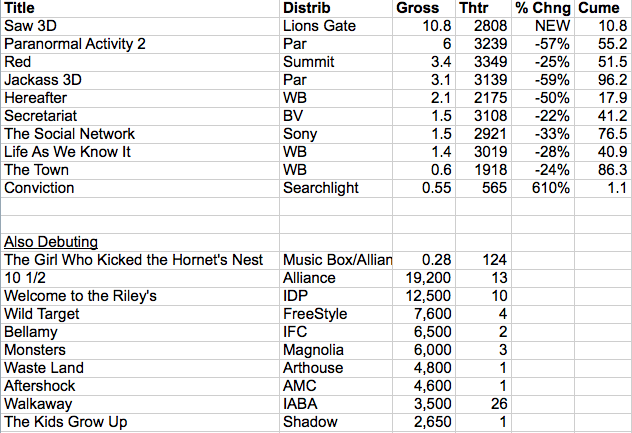Box Office Archive for October, 2010
Friday Estimates saw Klady

22. 20. 11.
aka The Last Three Fridays.
A cult series from which new content is rare, now in 3D, which seemed to fit. A sequel to a film that felt like an exciting discovery to audiences. And a dead franchise making a run at resurrection via 3D.
You can’t really blame Lionsgate marketing or any LGF management – though a frustrated Carl Icahn will – for this uninspired opening. The franchise was clearly body-bagged last year, with Saw VI managing about half, domestically, what any of the previous five Saws had done before. The fall-off was less severe overseas, but it was still the lowest international grosser of the series.
Did 3D matter? Yes. The first day was up about 50% from the last Saw. But still, both opening days for 6 & 7 are lower than any of the previous four sequels. 3D is not a savior. And film by film, everyone is figuring that out.
57% is a pretty good Friday-to-Friday hold – welcome to post-millennial box office – for Paranormal Activity 2. It’s hard to compare to the first film, since that one opened tiny and never ended up in as many theaters as this one opened in. But after a $20 million midnight/opening day launch, I think 57% off – which will make for a lower weekend drop – is solid.
Hereafter‘s 50% Friday-to-Friday drop is less encouraging.
Red‘s 25% drop is strong, leading a parade of 20somethings: Secretariat, the shocking Life As We Know It, and The Town.
The big limited opening is The Girl Who Kicked the Hornet’s Nest, which is opening better than the 100+ expansion of Dragon Tattoo, but not as strong as the mid-summer launch of Played With Fire.
13 Comments »









